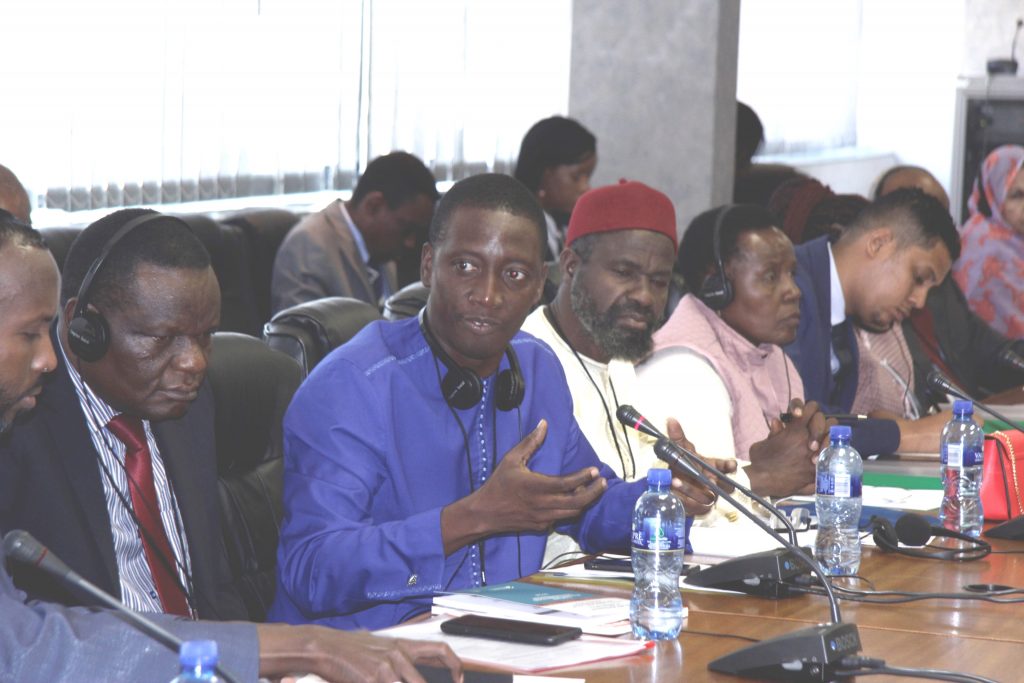The possession of passports and visas should not be a preserve of a few if Africa is to make advances for a peaceful, prosperous and integrated continent, experts have told Members of the Pan-African Parliament (PAP) sitting in Midrand, South Africa.
With major restrictions on freedom of movement of persons firmly entrenched in national laws and buttressed by weak regional mechanisms and even weaker political will, the benefits associated with free movement of persons will be out of reach.
Presenting a report titled, “Safe and Free Movement in Africa:
Obstacles and Opportunities in East and Southern Africa” to MPs on four different committees of the PAP on Monday, 2 August 2019, Dr Jean Pierre Misago, a researcher with the African Centre for Migration and Society said governments should abolish the pass system and promote free movement of persons.
The committees included Rules, Privileges and Discipline; Justice and Human Rights; Trade, Customs and Immigration Matters; and Transport, Industry, Communications, Energy, Science and Technology.
Posturing by some member states, mostly the most economically advanced, has undermined the aspirational goals of integration, economic cooperation, regional trade and mutual development, as enshrined in the Regional Indicative Strategic Development Plan (RISDIP).
While Uganda and Ethiopia were commended for their friendly refugee policies, Kenya was singled out for recently granting citizenship to thousands of Zimbabweans who have lived for decades in the country.
“We are longing for the day when Africa will be borderless. All these boundaries we have today where created by the colonialists to rule the Africans,” said Hon. Beatrice Kones (Kenya).
The African Continental Free Trade Agreement, which was signed in Kigali, Rwanda on 21 March 2018, has at the nucleus of its operationalisation the need for free movement of persons.
Hon. Felix Okot Ogong (Uganda) argued that whilst there was need to remove barriers that hinder movement, there was need to differentiate between free movement and free migration of persons.
“There must be reasons for free migration and this should be handled within the laws of particular countries,” Okot Ogong said.
Ms Ottilia Anna Mauganidze from the Institute of Security Studies based in South Africa said that Africa did not lack on the legal instruments to manage immigration but implementation has gaps.
It was noted in a conceptual note on migration that governance of migration and human mobility is largely driven by security considerations, whereby movement of persons is seen as a threat, and as such, the response has been either exclusion and or containment focused.
Anthony Mumba (Zambia) said the protective nature that governments take was because of the pressure from their citizens. “We need to first find out where the problems come from,” said Mumba.
With reference to his country, Seychelles, Hon. Wavel Joseph Woodcock said governments should allow persons into their territories. “Anybody in the world can come, live and work in Seychelles as long as they follow the country’s laws,” Woodcock said.
However, consensus was not reached in regard to obtaining a resolution from the MPs on the imperatives of free movement of persons and the assertion and protection of rights of migrants.
It is anticipated that the sensitive subject of migration will generate extensive debate during the plenary session later in October 2019.
PAP pays tribute to fallen MPs
Earlier, Members of the Pan-African Parliament paid tribute to two of their colleagues who recently died.
Hon. Elhadj Diao Kante, representing Guinea Conakry succumbed to a cancer-related ailment in a South African hospital on 13 June 2019 while Senator Michael Temple from Eswatini died suddenly following a morning gym workout at his home on 21 June, 2019.
Although the members of the continental parliament are engaged in meetings of the permanent committees in preparation for the October plenary session, they took off time to attend the special session to honour their fallen colleagues.
In a Monday, 2 August 2019 session chaired by the PAP President (Speaker), Roger Nkodo Dang, members spoke passionately about their departed colleagues.
“Although he was white in skin, he was actually more African than the Africans who were black. He espoused the values of Africanism much better than the people we think are Africans,” the PAP Vice President, Chief Fortune Charumbira said of late Temple.
“Hon. Temple was a very active, social and down to earth member. He was very articulate in advancing his ideas. We shall miss him,” Hon. Anifa Kawooya, one of Uganda’s five representatives to PAP said.
Both late Temple and late Kante had been members of PAP since 2004 and 2014 respectively.
